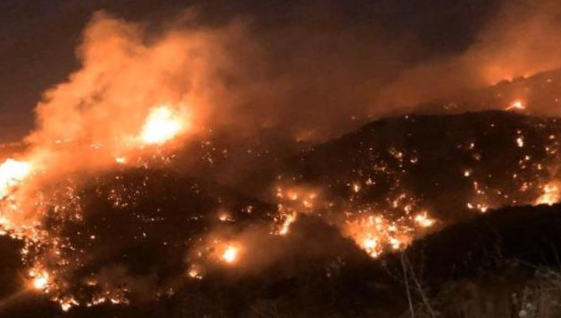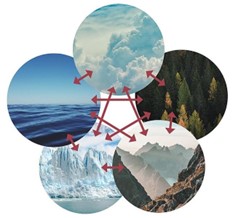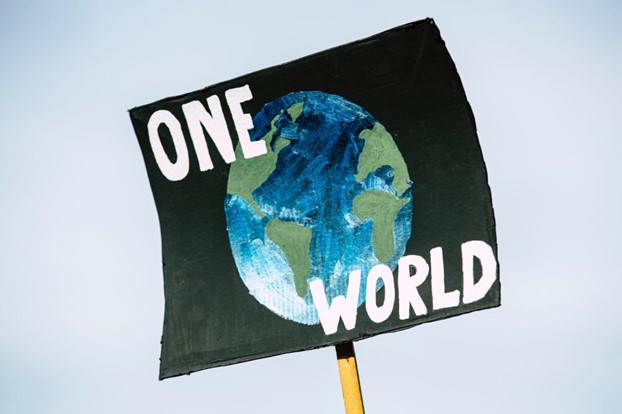Before Covid, place-based CPA groupings were emerging as fitted the local “ecology” and context, and with a mix of CPA and non CPA members. Now these are becoming increasingly important once again.
CPA is a Charitable Community Benefit Society, co-owned by its members, working for public and community benefit. Creatively it is a co-owned commons of knowledge, feeling and exploration, focussed on enabling and supporting awareness and agency in our response to the climate, ecological and psychosocial crisis with membership open to all who want to engage with the psychological aspects.
At the heart of the Climate Psychology Alliance are values of honesty, trust, care and respect. These underpin how we find a balance between autonomy and collaboration in the structures of decision-making and the work that we do.
We are a diverse community of therapeutic practitioners, thinkers, researchers, artists and others who believe that attending to the psychology and emotions of the climate and ecological crisis is at the heart of our work.
Climate psychology is concerned with the emotions, and the social and mental processes that have contributed to the ecological and climate crisis, and our responses and processes of adaptation to it.
In the Climate Psychology Alliance we draw on psychotherapeutic approaches, psychosocial studies, the arts, spiritual and philosophical thought, literature, systems thinking and ecopsychology, all in the service of unpicking our collective and individual responses to the crisis, much of which is unacknowledged and unconscious.
Climate psychology aims to contribute by
- building understanding and support for individuals and groups
- enabling transformation and adaptation
- helping us to cope with the consequences of the climate and ecological crisis.
We do this by creating shared spaces, networks and processes to explore ideas, to express what is often hidden or unbearable, to share emotions, to reconnect with our human and nonhuman kin, with our bodies and creative impulses and hope, in short, to help us all cope with these difficult truths and painful emotions.
This enables us to engage with the crisis and build resilience.
Climate psychology explores current existential anxiety and its associated defences, the ways old beliefs can be relinquished, and the ways we can open up to new ones. It imagines new sets of practices, forms of support, ways of living and being-with that can help communities survive and thrive. Climate psychology indicates a new way of imagining our internal worlds in all our connectedness and interdependence with the vital forces, the animate objects, the creatures with whom we share habitats’. (Hollway, Hoggett, Robertson & Weintrobe, 2022, p. 19-20)
In summary, Climate Psychology provides a nuanced psycho-social understanding that engages with the unacknowledged emotions and unconscious processes that play a role in the formation of intentions and behaviours: the ‘interactions between the personal and the political, the psychological and the social’ and the nature of our ‘collective paralysis’ (Andrews & Hoggett, 2021, p. 157).
Racism and colonialism at the heart of the climate and ecological crisis
Our approach is grounded in a historical, political context and we work to challenge colonial legacies that continue to underpin assumptions on the personal and relational level in our own communities, and in decision making at the political level. This means facing the difficult truth that racism and colonialism sit at the heart of the climate and ecological crisis, and re-examining our conceptual and relational frameworks.
The colonial, extractivist perception of our human and nonhuman neighbours as resources rather than kin has left us all bereft (Close, 2022). This position continues to reinforce racist assumptions, behaviours and priorities that perpetuate deep global inequality and associated trauma, particularly affecting Black, Indigenous and People of Colour. In recognising and responding to this, climate psychology is concerned with the impact of collective and intergenerational trauma, exploring ways to reconnect within ourselves, with each other and with the non-human world. Steffi Bedarek suggests, ‘It is not cognition, but relationship, community and a reconnection of exiled parts that brings healing into traumatised systems [...] This is a process of literal re-‘membering’ of that which has been torn apart, turning towards the wounding in the collective culture in order to be free from its long shadows. It is an act of cultural soul retrieval’ (2021, p. 26).
Turning towards the wounding is an admission that we are lost and that we need to open ourselves to being lost if we are to find our way. Bayo Akomolafe talks about being lost in terms of ‘the mutuality between ‘self’ and ‘other’, ‘part’ and ‘whole’, ‘here’ and ‘there’ (Akomolafe, 2015).
Climate psychology itself is a field emerging out of Western discourses of psychology so we, too, need to turn towards the wounding in our own culture, to allow ourselves to be open and lost, while being grounded in the emerging reality around us.
I think that in getting lost, in slowing down, the whole glimpses itself. Touches itself. (Akomolafe, 2015)
Why climate psychology now?
Our future depends on our choices and our capacity to confront the ecological and climate crisis, even as it is “unthinkable and unbearable” (Tait, 2021, p. 106).
At the same time, it depends on the complex unpredictable interaction of different elements of the earth’s ecosystem, including tipping points, feedback loops and potentially cascades of interrelated consequences. Climate ‘change’ may not be a gradual process, however much we wish.
This means ‘we need to act in proportion to the magnitude of the challenge’ (Figueres & Rivet-Carnac, 2020, p. 12). Understanding climate psychology and developing creative approaches to support people is both necessary and urgent.
 Facing the Science
Facing the Science
Confronting the reality of the scientific evidence without shutting ourselves down emotionally is difficult. We need to find ways to be present in our situation and allow space to express climate distress without becoming so overwhelmed we are unable to act. Below, we provide a brief summary of some of the key issues emerging in climate science that give a context for the work we do. If this brings to the surface distressing thoughts and feelings, please feel welcome to attend one of our climate cafes or check out our podcasts. Ro Randall’s short videos on Coping with the Climate Crisis (2020) are also helpful in understanding and accepting these intense feelings.
Tipping points, complexity and connectivity
There are warning signs that we are dangerously close to, or have reached, tipping points (abrupt and irreversible changes) in a number of areas. (CCAG, 2021; Lenton et al., 2019). These include the melting of ice sheets in the Antarctic and Greenland, loss of Arctic sea ice, loss of coral reefs, thawing of permafrost, loss of boreal forest, loss of the Amazon Rainforest, and the collapse of the Atlantic Meridional Overturning Circulation (AMOC).
The connectivity between these shifts helps us understand the urgency of the situation and the significance of the extreme weather events we are already seeing. The earth is a complex living system; we cannot separate it into easy to manage compartments.The melting of Arctic sea ice affects the Atlantic Meridional Overturning Circulation (AMOC), boreal forests and permafrost. The Atlantic circulation affects the Amazon Rainforest and the Antarctic ice sheets (Lenton et al., 2019).
 The Amazon contributes to the water cycle bringing rain to huge areas of fertile land.
The Amazon contributes to the water cycle bringing rain to huge areas of fertile land.
We human beings are part of this ecosystem. It is our home, our shared habitat. However, the objective voice of science and policy excludes feelings of personal or community loss and grief. It distances us from the consequences of the crisis, which many people are already experiencing around the world, and the anger and fear it induces.
David Wallace-Williams in The Uninhabitable Earth, discusses directly the impacts on human beings: heat death, hunger, sea level rise, wildfires, freshwater drain, dying oceans, unbreathable air, plagues, economic collapse, climate conflict (2019). Climate and ecological disasters are already happening and becoming more frequent and widespread and we need to recognise this if we are to adapt and survive. Seeing the scale of the crisis can be overwhelming. However, for people not already directly affected, it brings closer the consequences of continuing “business as usual”.
So what does it mean to ‘act in proportion to the magnitude of the challenge’?
We know there is action we can take to reduce future harm, to restore some damaged ecosystems, and to adapt to the changes that are already happening. The scale of transformation needed means that we need to face fundamental questions about our values and how we live. This includes emotional, psychological and relational adaptation, and what Jem Bendell calls ‘deep adaptation’ (2021).
We need a restorative approach to our ecosystems, recalibration of our place in those systems, and indeed a restorative approach to our relational structures. We need to move away from the ‘culture of uncare’ identified by Sally Weintrobe (2021), towards one of radical regeneration on a personal, relational and societal level, and most importantly, in how we facilitate healing in our ecosystems (Christiana Figueres & Tom Rivett-Carnac, 2020).
To read more about Climate Psychology, our wikipedia page provides a concise overview of key ideas and the emergence of the field and The Handbook of Climate Psychology provides short explanations of key concepts and their importance in Climate Psychology.
References
Akomalafe, B. (2015). Getting Lost. https://www.bayoakomolafe.net/post/getting-lost.
Andrews, N. & Hoggett, P. (2019). Facing up to ecological crisis: a psychosocial perspective from climate psychology. in J Foster (ed.), Facing up to climate reality: honesty, disaster and hope. Green House / London Publishing Partnership
Bendell, J. (ed.) (2021). Deep adaptation: navigating the realities of the climate crisis. Polity Press.
Figueres, C. & Rivett-Carnac, T. (2020). The future we choose: surviving the climate crisis. Manilla Press.
Hollway, W., Hoggart, P., Robertson C. & Weintrobe, C. (2022). Climate psychology: a matter of life and death. Phoenix Publishing House Ltd.
Lenton, T. M., Rockström J., Gaffney, O., Rahmstorf, S. Richardson, K., Steffen, W., & Schellnhuber, H. J. (2019). Climate tipping points — too risky to bet against. Nature 575, 592-595
Tait, A. (2021) Climate psychology and Its relevance to deep adaptation. In Bendell, J. (ed.) Deep adaptation: navigating the realities of the climate crisis. Polity Press.
Wallace-Williams, D. (2019). The uninhabitable earth: a story of the future. Penguin Books.
Weintrobe, S. (2021). Psychological roots of the climate crisis: neoliberal exceptionalism and the culture of uncare. Bloomsbury Publishing. Kindle Edition.







